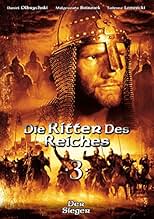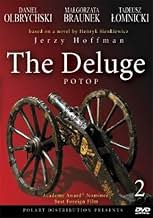CALIFICACIÓN DE IMDb
7.7/10
3.3 k
TU CALIFICACIÓN
Agrega una trama en tu idiomaDuring the 1655 war between Protestant Sweden and Catholic Polish-Lithuanian Commonwealth some Polish-Lithuanian nobles side with Swedish king Charles X Gustav while others side with the Pol... Leer todoDuring the 1655 war between Protestant Sweden and Catholic Polish-Lithuanian Commonwealth some Polish-Lithuanian nobles side with Swedish king Charles X Gustav while others side with the Polish king Jan Kazimierz.During the 1655 war between Protestant Sweden and Catholic Polish-Lithuanian Commonwealth some Polish-Lithuanian nobles side with Swedish king Charles X Gustav while others side with the Polish king Jan Kazimierz.
- Nominado a 1 premio Óscar
- 4 premios ganados y 1 nominación en total
Argumento
¿Sabías que…?
- TriviaThe third most popular film in the history of Polish cinema, with more than 27.6 million tickets sold in its native country by 1987, and 30.5 million sold in the Soviet Union.
- ConexionesFeatured in Sexify: Episode #1.6 (2021)
Opinión destacada
Note: "Potop" means "Deluge", and is labeled such on some international covers of the film, though not all.
This is one of the greatest post-medieval war films, yet unfortunately is largely ignored by audiences today. Perhaps it is because this is Polish production based on a historical Polish novel. However, although the story is based vaguely on Polish history, nearly all of the characters, except for the Polish king & some members of Polish aristocracy, are fictional. That is not to say the events or characters are untrue to life - just the opposite: they are wonderful representations of people thrust into universal situations of desperation. It is easy for anyone to identify with many of the characters depicted in the film. Director Hoffman has created people, not just characters, they seem so real that one feels almost able to reach into the screen and touch them. Another interesting factor is that they are people from all walks of life. Unlike Kurosawa's "Ran" (another fascinating film about post-medieval warfare), the people represented on screen are not just the leaders responsible for the actual war. Everyone from peasant folk to the highest ranking military personnel is covered - and they are all deep characters, with emotions and feelings, not just hordes of faceless crowds running to battle to be slaughtered. This creates a full tapestry of characters unlike anything seen in any film of this kind.
The cinematography is another factor worthy of mention, especially regarding its intended relation to the depicted events. The locations reach from breathtaking and beautiful images of Polish forests to the cold and hopeless feeling of winter. It's interesting to note that the mood of the cinematography quite often directly reflects the mind-set of the characters, especially the character Andrzej Kmicic (played by Daniel Olbrychski). Kmicic, without a doubt the most interesting personality in the film, is often a very irrational man. He lapses, quite suddenly, from emotions of extreme hatred and rage, to feelings of unquestionable love, and the cinematography perfectly reflects this instability. This becomes especially evident in the latter portion of the film, as the Swedish army encroaches Poland, and the situation becomes desperate for all the characters involved. The landscape at this point becomes desolate and cold, as if the invading Swedes brought with them not only weapons of death, but also the excruciating winter of the Scandinavian north. Even the music reflects this atmosphere of desolation, as is best evidenced in a scene of the Swedish army marching into Poland. The music at this point becomes powerful to the extreme, yet it is a simple tune played by many instruments, creating an atmosphere that conveys feelings of the freezing winter by aural means alone.
"Potop" is flawlessly directed by Jerzy Hoffman, one could say that this was his greatest achievement. His previous film "Pan Wolodyjowski", based on the third part of the same trilogy of books, was also wonderful, but it failed to convey the chaotic and senseless nature of war as well. With "Potop" Hoffman has created a masterpiece. It is dark, cruel, and ruthless, as war always is. The editing, supervised by Hoffman, is flawless. In 1999 Hoffman brought the first part of the Sienkewicz trilogy to screen in the form of "Ogniem i Mieczem" ("With Fire And Sword"), but left the editing to a young editor who tried to impress young audiences with pointless fast edits, which made that film nearly unbearable to watch. With "Potop" we can see a master at his best - there are a few fast edits where such editing is appropriate, and many long perfectly choreographed shots that reflect both the beauty of the landscape, and the desperation of the characters involved.
The acting is another factor that makes this such a wonderful film. There are so many interesting characters and excellent performances to match, that it would be impossible to cover them all. However, two actors that truly stand out here are the late Tadeusz Lomnicki in the role of Michal Wolodyjowski, the same role he portrayed in "Pan Wolodyjowski", and of course Daniel Olbrychski as the erratic Andrzej Kmicic. The only oddity here is that Daniel Olbrychski actually appears in all three parts of the trilogy as three very different characters. In "Pan Wolodyjowski" he plays the evil Azja Tuhaj-bejowicz, and in "Ogniem i Mieczem" he is Azja's father Tuhaj-Bej. This makes some sense in terms of the first and third part of the trilogy, since we'd expect the son to look a little like his father, but in "Potop" he plays a Polish noble. This can be a little distracting when you see all parts of the trilogy, yet it is impossible to deny that Daniel Olbrychski is one of the best actors of the last three decades, so it's no surprise that Hoffman wanted Olbrychski to appear in all three parts of the trilogy.
Overall, this is one of the greatest war films of all time. Because of its ability to create real humans out of characters, it is also a fine film compared to any genre. Unless you are deathly afraid of subtitles, you will surely agree. War is hell, and this film represents that perfectly! Highly recommended.
This is one of the greatest post-medieval war films, yet unfortunately is largely ignored by audiences today. Perhaps it is because this is Polish production based on a historical Polish novel. However, although the story is based vaguely on Polish history, nearly all of the characters, except for the Polish king & some members of Polish aristocracy, are fictional. That is not to say the events or characters are untrue to life - just the opposite: they are wonderful representations of people thrust into universal situations of desperation. It is easy for anyone to identify with many of the characters depicted in the film. Director Hoffman has created people, not just characters, they seem so real that one feels almost able to reach into the screen and touch them. Another interesting factor is that they are people from all walks of life. Unlike Kurosawa's "Ran" (another fascinating film about post-medieval warfare), the people represented on screen are not just the leaders responsible for the actual war. Everyone from peasant folk to the highest ranking military personnel is covered - and they are all deep characters, with emotions and feelings, not just hordes of faceless crowds running to battle to be slaughtered. This creates a full tapestry of characters unlike anything seen in any film of this kind.
The cinematography is another factor worthy of mention, especially regarding its intended relation to the depicted events. The locations reach from breathtaking and beautiful images of Polish forests to the cold and hopeless feeling of winter. It's interesting to note that the mood of the cinematography quite often directly reflects the mind-set of the characters, especially the character Andrzej Kmicic (played by Daniel Olbrychski). Kmicic, without a doubt the most interesting personality in the film, is often a very irrational man. He lapses, quite suddenly, from emotions of extreme hatred and rage, to feelings of unquestionable love, and the cinematography perfectly reflects this instability. This becomes especially evident in the latter portion of the film, as the Swedish army encroaches Poland, and the situation becomes desperate for all the characters involved. The landscape at this point becomes desolate and cold, as if the invading Swedes brought with them not only weapons of death, but also the excruciating winter of the Scandinavian north. Even the music reflects this atmosphere of desolation, as is best evidenced in a scene of the Swedish army marching into Poland. The music at this point becomes powerful to the extreme, yet it is a simple tune played by many instruments, creating an atmosphere that conveys feelings of the freezing winter by aural means alone.
"Potop" is flawlessly directed by Jerzy Hoffman, one could say that this was his greatest achievement. His previous film "Pan Wolodyjowski", based on the third part of the same trilogy of books, was also wonderful, but it failed to convey the chaotic and senseless nature of war as well. With "Potop" Hoffman has created a masterpiece. It is dark, cruel, and ruthless, as war always is. The editing, supervised by Hoffman, is flawless. In 1999 Hoffman brought the first part of the Sienkewicz trilogy to screen in the form of "Ogniem i Mieczem" ("With Fire And Sword"), but left the editing to a young editor who tried to impress young audiences with pointless fast edits, which made that film nearly unbearable to watch. With "Potop" we can see a master at his best - there are a few fast edits where such editing is appropriate, and many long perfectly choreographed shots that reflect both the beauty of the landscape, and the desperation of the characters involved.
The acting is another factor that makes this such a wonderful film. There are so many interesting characters and excellent performances to match, that it would be impossible to cover them all. However, two actors that truly stand out here are the late Tadeusz Lomnicki in the role of Michal Wolodyjowski, the same role he portrayed in "Pan Wolodyjowski", and of course Daniel Olbrychski as the erratic Andrzej Kmicic. The only oddity here is that Daniel Olbrychski actually appears in all three parts of the trilogy as three very different characters. In "Pan Wolodyjowski" he plays the evil Azja Tuhaj-bejowicz, and in "Ogniem i Mieczem" he is Azja's father Tuhaj-Bej. This makes some sense in terms of the first and third part of the trilogy, since we'd expect the son to look a little like his father, but in "Potop" he plays a Polish noble. This can be a little distracting when you see all parts of the trilogy, yet it is impossible to deny that Daniel Olbrychski is one of the best actors of the last three decades, so it's no surprise that Hoffman wanted Olbrychski to appear in all three parts of the trilogy.
Overall, this is one of the greatest war films of all time. Because of its ability to create real humans out of characters, it is also a fine film compared to any genre. Unless you are deathly afraid of subtitles, you will surely agree. War is hell, and this film represents that perfectly! Highly recommended.
- letrias
- 27 ago 2002
- Enlace permanente
Selecciones populares
Inicia sesión para calificar y agrega a la lista de videos para obtener recomendaciones personalizadas
- How long is The Deluge?Con tecnología de Alexa
Detalles
- Fecha de lanzamiento
- Países de origen
- Idioma
- También se conoce como
- The Deluge
- Locaciones de filmación
- Pidhirtsi, Lviv Oblast, Ucrania(battle scenes)
- Productoras
- Ver más créditos de la compañía en IMDbPro
Taquilla
- Presupuesto
- PLN 100,000,000 (estimado)
Contribuir a esta página
Sugiere una edición o agrega el contenido que falta

Principales brechas de datos
What is the Spanish language plot outline for El diluvio (1974)?
Responda


































